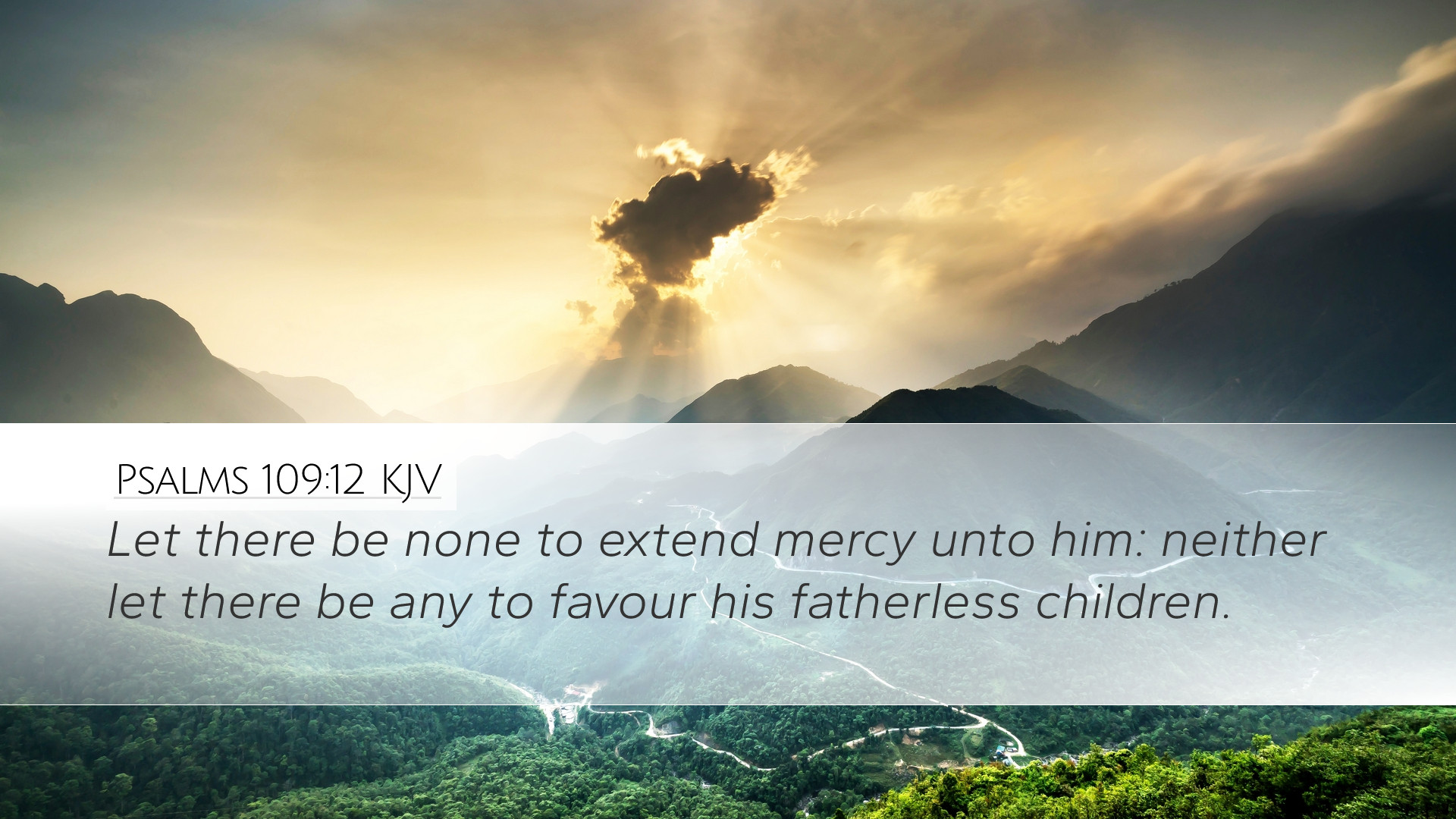Commentary on Psalm 109:12
Psalm 109 is a deeply emotional poem attributed to David, expressing distress and the desire for vindication against his enemies.
Verse 12 states: "Let there be none to extend mercy unto him: neither let there be any to favour his fatherless children."
This verse reflects both a cry for justice and a call for the consequences of the wrongdoing of the opponents.
Contextual Background
The psalm exemplifies the imprecatory nature of certain psalms where the psalmist invokes curses upon his enemies.
Throughout the psalm, David grapples with feelings of betrayal, slander, and persecution. This particular verse underscores the severity of his opponents' actions and his wish for divine justice.
Insights from Public Domain Commentaries
Matthew Henry's Commentary
Matthew Henry emphasizes the gravity of David's petition that mercy should be withheld from his adversaries. He points out that the absence of mercy
signifies a complete withdrawal of God’s grace. This reflects the biblical principle that those who show no mercy to others may themselves find mercy
removed from them. Henry explains that invoking curses like this is a reflection of the anguish that arises when one feels persecuted or wronged,
and it is important to note that the psalmist is appealing to God for a righteous judgment.
Albert Barnes' Notes on the Bible
Albert Barnes provides a thorough investigation into the implications of verse 12. He highlights that David is not calling for personal revenge but
is expressing the solemn truth about the consequences of sinful actions. In his view, a lack of mercy for the individual signifies a longer-lasting pattern
of his life and actions that have led to divine judgment. Barnes interprets “fatherless children” as a poignant aspect, presenting David’s concern about the
innocent suffering due to the sins of the father. The plea for no mercy serves as a foreshadowing of divine justice that aligns with the wider biblical
themes of retribution and justice.
Adam Clarke's Commentary
Adam Clarke elaborates on the theological implications of the psalm. He points out the importance of recognizing that the prayer for judgment is not merely
personal vendetta but a clear articulation of God's justice. Clarke emphasizes that the plight of the fatherless indicates the devastating impact of sin
and injustice on the innocent. By stating that no one should show mercy, David is reflecting the seriousness of the situation, illustrating the dire need
for God's intervention. Clarke's commentary suggests that while God is loving and merciful, He is also just, and the prayer for justice underscores the complexity
of God's nature – one that is deeply concerned with righteousness.
Theological Themes and Implications
Psalm 109:12 brings forth significant theological themes that are relevant for pastors, students, and theologians:
-
The Nature of Divine Justice:
The call for judgment reveals the belief in a God who is just and impartial. The psalmist's plea reflects a deep understanding that divine justice entails
consequences for actions and emphasizes the holistic nature of God's character.
-
The Role of Human Suffering:
David's concern for the fatherless exemplifies the compassion at the heart of justice. The psalm highlights the impact of individuals' sin, not just on themselves
but on their families and the broader community.
-
Imprecatory Psalms:
This verse is a part of the genre of imprecatory psalms, which can challenge modern readers. Understanding the context helps reconcile the nature of these prayers
with the New Testament calls for love and mercy. It emphasizes that God calls for justice while also being merciful.
Pastoral Applications
For pastors, Psalm 109:12 can serve as a poignant reminder in teaching about justice, mercy, and the balance of God's character.
Consider the following applications:
-
Teaching on God's Justice:
This verse can open discussions about God's justice as an essential attribute and how it operates in our lives. Preaching through this psalm allows congregations
to grapple with the reality that our actions hold weight and carry consequences.
-
Empathy for the Marginalized:
Reflecting on the plight of the fatherless can encourage congregations to advocate for the vulnerable in society, demonstrating a faith that is active and concerned with social justice.
-
Understanding Anguish:
Pastors can provide guidance for those experiencing deep emotional pain or betrayal, using David's cries as a model for bringing grievances before God,
reminding them of the voice they have in prayer.
Conclusion
In summary, Psalm 109:12 serves not only as a personal lament but as a profound theological reflection on justice, mercy, and their implications in the lives
of believers. Integrating insights from commentators enhances our understanding of the text, helping pastors, students, and scholars delve into the complexities
of faith amidst hardships. It reminds all to seek God's justice while extending mercy to those around them, navigating the thin line between divine retribution
and compassionate grace.


